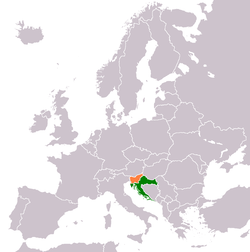- Croatia–Slovenia relations
-
Croatian-Slovenia relations 

Croatia
SloveniaCroatian-Slovenia relations are foreign relations between Croatia and Slovenia. Before 1991, both countries were part of Yugoslavia. On June 26, 1991, a mutual recognition agreement was signed by both countries. Diplomatic relations between both countries were established on February 6, 1992. Croatia has an embassy in Ljubljana and 2 honorary consulates in Maribor and Koper. Slovenia has an embassy in Zagreb and an honorary consulate in Split. Both countries share 670 km of common border.
Relations between Slovenia and Croatia have been friendly, but burdened with constant disputes, including several unresolved minor border disputes, namely:
- the division of former Yugoslav territorial waters, particularly in the Gulf of Piran;
- the hamlets of Bužini, Mlini, Škodelini and Škrile located to the south of river Dragonja in Istria, which were administered by Croatia from 1954, and which Slovenia claims as part of cadaster municipality Sečovlje;
- the Sveta Gera (Trdinov vrh) peak in the Žumberak/Gorjanci, with the Slovenian Army occupying barracks that lay partially in Croatian territory;
- the changing meanders of the river Mura, near Hotiza and Sveti Martin na Muri, where the situation in nature differs from the descriptions in official maps and documents.
Other opened issues are the implementation of the joint management of the Krško Nuclear Power Plant, the financial compensation for the Croatian depositors who lost their savings in the liquidation of the Slovenian-based Yugoslav bank Ljubljanska banka.
Although, the most important disputed issue with Croatia is Slovenian and Italian opposition to the proclamation of the Croatian Ecological and Fisheries Protection Zone (Exclusive Economic Zone) in the Adriatic sea.
In a series of high-level meetings since the latter half of 1998, Slovenia and Croatia have been engaged in settling bilateral differences, a process which accelerated after the death of Croatian President Franjo Tuđman in 1999. Slovenia has supported Croatia's entry in the European Union, but has demanded that the opened bilateral questions be resolved before Croatia's accession to the Union.
A referendum was held June 6, 2010 in Slovenia regarding the ratification of the agreement on the arbitration between Slovenia and Croatia regarding the Gulf of Piran border dispute. Croatia and Slovenia agreed to let outside arbitrators come up with a plan to divide the Gulf in 2009 in the hopes of finding a resolution to the dispute and easing Croatia's entry to the Union. Though the parliaments in both Croatia and Slovenia ratified the agreement, the Slovene parliament additionally voted to require a public referendum on the deal.[1] According to the official results, published on June 29, 2010, by the National Electoral Commission, the agreement was supported by 51.54% of voters and opposed by 48.46% of voters.[2] In October 2010, the Slovenian law on the ratification of the agreement was also unanimously recognized by the Slovenian Constitutional Court as being in accordance with the Constitution of Slovenia.[3] The diplomatic notes about the agreement were exchanged between the Government of Slovenia and Government of Croatia on November 25, 2010. The agreement came into force on November 29, 2010.[4]
References
- ^ "Slovenia backs Croatia border deal in referendum vote". BBC News. 2010-06-06. http://news.bbc.co.uk/2/hi/world/europe/10248037.stm. Retrieved 2010-06-11.
- ^ "Poročilo o izidu glasovanja in o izidu zakonodajnega referenduma o ratifikaciji arbitražnega sporazuma med Vlado Republike Slovenije in Vlado Republike Hrvaške, ki je bil 6. junija 2010" (in Slovene). The National Electoral Commission of the Republic of Slovenia. http://www.dvk.gov.si/AS2010/dokumenti/porocilo.pdf.
- ^ "Ustavno sodišče odločilo: Arbitražni sporazum skladen z ustavo [The Constitutional Court has decided: The Agreement on the Arbitration is in accordance with the Constitution]" (in Slovene). MMC RTV Slovenija. 18 October 2010. http://www.rtvslo.si/slovenija/ustavno-sodisce-odlocilo-arbitrazni-sporazum-skladen-z-ustavo/241858.
- ^ "V ponedeljek nov fantastičen dan [A New Fantastic Day on Monday]" (in Slovene). MMC RTV Slovenija. 25 November 2010. http://www.rtvslo.si/evropska-unija/v-ponedeljek-nov-fantasticen-dan/244796.
See also
- Foreign relations of Croatia
- Foreign relations of Slovenia
- Croatia–Slovenia border disputes
- Slovenia's blockade of Croatia's EU accession
External links
- Croatian Ministry of Foreign Affairs and European Integration: list of bilateral treaties with Slovenia
- Croatian embassy in Ljubljana (Croatian) (Slovene)
 Foreign relations of Croatia
Foreign relations of CroatiaEurope 
Elsewhere Missions  Foreign relations of Slovenia
Foreign relations of SloveniaElsewhere 
Europe Missions Categories:- Bilateral relations of Croatia
- Bilateral relations of Slovenia
Wikimedia Foundation. 2010.
